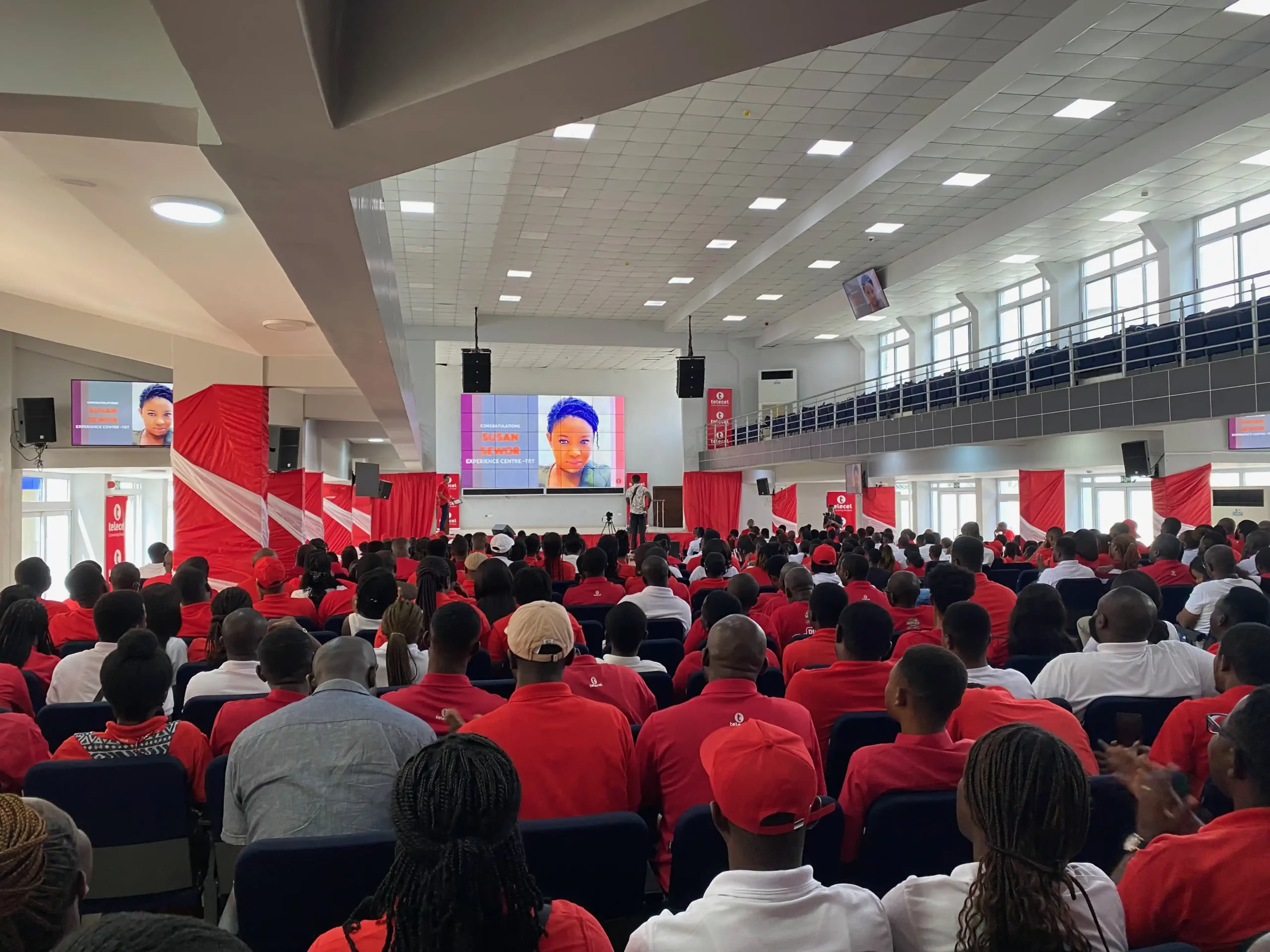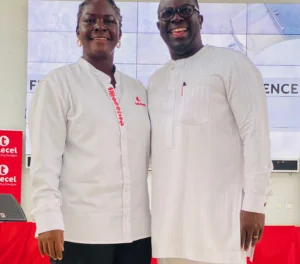INTRODUCTION
Telecel Ghana, formerly Vodafone Ghana, has an amazing annual practice of bringing together its 1,300-strong frontliners to appreciate them—not just with words but in awards—and ginger them up to do even better for their clientele. This Frontline Engagement Conference, as they call it, typically happens during the global Customer Service Week in October, which they’ve extended to the whole month to appreciate their customers.
This year, as the principal coach/speaker/trainer at Perbi Executive Leadership Education (PELÉ), Telecel extended to yours truly the humbling opportunity to address their army of frontliners and frontline support staff. Frontliners mean everything to any business! They are essential workers whose jobs depend on in-person interactions and often involve some form of risk, even if it’s verbal abuse. If this were soccer, frontliners would be our strikers! No scoring on this front, no bottomline success. Period. I was particularly impressed that the CEO of Telecel, Ing. Patricia Obo-Nai, prioritised this event such that not only was she in attendance from start to finish, she was fully present and participatory to the max.
This article aims to summarise the keynote I delivered on behalf of PELÉ entitled, “WANTED: INTRAPRENEURS!” This burning message to the rank and file of a top-tier provider of digital and telecommunications solutions across the African continent is one which, quite frankly, every company and organisation needs to hear.
FUNNY BUT NOT FUNNY
Several years ago, I had an appointment in downtown Accra but needed to pass through the bank to make a transaction first. I waited and waited and waited… and it was becoming evident that I might miss my appointment altogether. So, I got up and approached one of the bankers to express both my frustration and concern that I needed to make it for an appointment and here I was stuck in the bank.
Here was her response (I kid you not; and I remember as though it were yesterday): “Nti wonni time na w’aba bank no?” she said in Twi. To wit, “So you don’t have time and you came to the bank?” Needless to say, I was stupefied; or rather, mortified. If there ever was the opposite of a staff being intrapreneurial, it is that!
DEFINING INTRAPRENEUR(SHIP)
Everyone knows about entrepreneurs and entrepreneurship. But what in the world is an intrapreneur—and then intrapreneurship? To cover our bases, Investopedia defines an entrepreneur as “an individual who creates a new business, bearing most of the risks and enjoying most of the rewards. The process of setting up a business is known as entrepreneurship. The entrepreneur is commonly seen as an innovator, a source of new ideas, goods, services, and business/or procedures” (emphases mine).
With that at the back of our minds, the simplest definition of an intrapreneur would be an employee who behaves like an entrepreneur. Rather than going out to create a new business/organisation, they stay within it and use their innate entrepreneurial aptitudes and attitudes to significantly grow it. Gifford Pinchot III (1985) defined intrapreneurs as, “Dreamers who do. Those who take responsibility for creating an innovation of any kind within an organisation.” He is credited with inventing the concept of intrapreneurship in a paper that he and his wife, Elizabeth Pinchot, wrote in 1978 titled “Intra-Corporate Entrepreneurship.” Intrapreneurs then, are entrepreneurs within–within themselves and within their organisations/businesses.
DIGGING DEEPER
Intrapreneurs have an attitude and style that integrates Responsibility, Risk-taking, Ownership, Innovation (ROI). I like that these basic characteristics spell ROI, literally portraying how it’s entrepreneurs who bring a company its best Return on Investment (ROI). Roi, the French word for king, is also apt, for intrapreneurs are royalty in establishments, they are the kings and queens of any business. In 2014, Forbes declared that intrapreneurs are the most valuable employees from here on out. “Social intrapreneurs are quickly becoming the most valuable employees at many companies because they are good for the bottom line, good for the brand, and good for staff morale.” [1]
At the core of ROI is ownership, owning the opportunities and challenges at the workplace, assessing situations and taking responsibility (the R again) for one’s attitude, behaviour and outcomes. Here is where I challenge Management about ensuring they provide the legal and logistical framework—as well as whatever enabling environment—that empowers employees to take initiative and risk to innovatively solve problems boldly. A great example is the Ritz-Carlton hotel chain which has for many years given staff $2,000 of discretion to be used to solve any customer complaint in the manner the employee feels is appropriate. And this is daily! I recall hearing the author of The New Gold Standard: 5 Leadership Principles for Creating a Legendary Customer Experience Courtesy of The Ritz-Carlton Hotel Company tease out how this incentive works in practice and that the training is that if a customer/guest/client reports an issue to you, you own it 100% up to $2,000 worth, and until it is resolved, irrespective of your job description at the hotel chain. If as a gardener, you are approached with a television problem you intrapreneurially solve it, even if it means buying a new $1,000 television for the client. You don’t say, “Oh sorry, I’m just a gardener;” and you definitely do not go pointing fingers at your colleagues in another department, much less diss them. You own it!
REAL VALUE, REAL STORIES
Apparently, “Over 70% of transformative innovations are conceived, developed and commercialised by employees working within large companies. This finding stands in stark contrast to how contemporary society currently celebrates entrepreneurs as heroes.” [2] The most world-famous intrapreneur story must be that of Art Fry and how he made his company 3M billions of dollars by discovering a great use of a unique adhesive another 3M scientist had developed five years earlier but had found no practical use for it yet. That is a short version of the success story of Post-It Notes. [3] Did you know that the 3M company, with 2023 revenue of $33 billion, and with a recurring spot on the enviable Fortune 500 list, owed a great part of its success to intrapreneurship? Adhesive paper of all things, for a company originally named Minnesota Mining and Manufacturing (later 3M).
In Africa, the phenomenal success of FinTech, is another triumph of intrapreneurship. A couple of years before Momo (MTN’s version of Mobile Money) would take Ghana by storm, two middle managers from Vodafone and Safaricom in Kenya launched the mobile payment product from within their established companies in 2007. [4] Calling it M-Pesa, last year it boasted 51 million customers, with Kenya as its largest market, accounting for over 30 million users, many of whom previously did not have bank accounts. The service notably handled 26 billion transactions in the financial year ending March 31, 2023. SMEs in Kenya hugely depend on M-Pesa to receive payments from customers to the extent that in the last financial year to March 2023, more than 606,000 businesses were receiving payments through Lipa Na M-PESA. [5] That too, is a triumph of intrapreneurship.
[Mr. Kwame Pianim being interviewed by Dr. Yaw Perbi at Live2Lead Ghana on October 4, 2024]
I am in the throes of properly documenting the various contributions to nation building of the Ghanaian Economist and statesman Kwame Pianim, arguably the most unsung intrapreneur in Ghana’s history. Working within government circles and later in an investment company he co-founded, he re-engineered Ghana’s pension scheme to provide long-term investment capital and carefully christened it Social Security and National Insurance Trust (SSNIT) to calm touchy nerves. He also is the originator of the Teachers’ Fund (which but for the recent precipitous decline of the Ghanaian currency should be worth over a billion dollars now) and the SpinTex (spinning textiles) industrial company (now area), among others. Cheers to intrapreneurship!
A DIFFERENT WAY OF THINKING
It is the software (mindsets) that each employee runs that makes them produce different outputs: low performers, performers and high performers. Jason Jaggard, CEO of Novus Global, says “People at the different levels of performance tend to ask different types of questions of themselves.” [6] Low-performers ask the question, “What’s the least amount of work I can do and not get fired?” Performers ask themselves, “How can I do a good job?” These people don’t want to be horrible but they don’t want to be great either. High-performers ask the question, “How can I be the best?” But the best intrapreneurs actually go beyond high performance, they attain what Jaggard calls “Meta-performance” because instead of comparing themselves to others (to be best) they rather compare themselves to their potential and ask, “What am I capable of.” The best intrapreneurs are meta-performers!
At PELÉ trainings and keynotes, we motivate potential intrapreneurs to remember that they are already champions by virtue of being born, outwitting anything from 40 million to 1.2 billion sperms to take the prize, surviving nine months of pregnancy and bursting forth, some into very untoward circumstances. They outwitted the childhood killer diseases, survived school (even if they did not thrive) and have landed an enviable job at a place that is forward-looking enough to invite PELÉ to interface with them. People are born geniuses and winners; then see what nonsense life tells them and what wimps it makes them into! May no eagle die like a barnyard chicken because that is what they thought they were!
NO RISK, NO REWARD
In quite an elaborate manner, Jordan Daykin in Forbes describes intrapreneurs as, “A team of competitive, confident individuals who are committed to innovation, passionate about work and producing higher value for their employer [I would say stakeholders]. They will need to have an entrepreneurial spirit, be activators of ideas and have a willingness to take calculated risks. In return for their desire to help the growth of the company over financial reward, they will receive support and resources to help make their ideas a reality.” [7]
Daykin’s description gives the impression that there are no rewards for intrapreneurs per se apart from support and resources, but the rewards are many, even financial. At Telecel, for example, the whole Frontline Engagement Conference was a ‘speech and prize-giving day.’ From cash amounts to household equipment, staff were awarded for their dedicated intrapreneurship, connecting to clients with care. Besides, Telecel as a case study rewards intrapreneurs with citations, shopping vouchers, and Thank You publications on their internal platforms for all colleagues to see. According to the General Manager of Commercial Operations at Telecel Ghana who leads 1,000 staff, Mercy Dawn Akude, in addition to the above are quarterly and biannual award ceremonies for frontliners. “The Business now has the Most Valuable Player Awards which celebrates stories which go above and beyond quarterly recognitions, and not only for frontliners. This is new, and yet to be celebrated,” she adds. Even in the past, when Telecel was Vodafone, they celebrated local and global heroes with a focus on the customer. The global heroes were flown to the United Kingdom to be celebrated with other heroes.
General Manager of Commercial Operations at Telecel Ghana, Mercy Dawn Akude, with the Intrapreneurship keynote speaker, Dr. Yaw Perbi, at the Frontline Engagement Conference in Accra.
How about the societal impact and becoming a life of significance as a result? Whether Post-It Notes or M-PESA, the socioeconomic impact intrapreneurs make on communities, businesses and indeed the world cannot be overemphasised. But really, first of all, as an old saying goes, “if you do good, you do it for yourself.” It’s for an intrapreneur’s own good that they are fulfilling their potential, sharpening their skills, ramping up their reputation, and feeling accomplished. Besides, these are transferable benefits that inure to their person and can be used for their own enterprise somewhere else simultaneously or someday. How about being able to count on referrals and recommendations from one’s supervisors? Indeed, “if you do good, you do it for yourself.”
Besides, as long as the laws of the universe operate, others will treat you the same way you treat your employers and employment. And for people of faith, ultimately if you do good, you do it for yourself not only on earth but also for eternity; plus you do it for your God! Here’s what I mean: “For we must all appear before the judgement seat of Christ, so that each of us may receive what is due us for the things done while in the body, whether good or bad.” [8] In the same way, if you let your light shine as an intrapreneur, people “may see your good deeds and glorify your Father in heaven.” [9] There is an eternal reward for being a bad, good, better, best, meta intrapreneur.
CONCLUSION
If folks in companies and organisations would choose to be the best version of themselves, their combined compassion, competitiveness, confidence, commitment (not just involvement), plus great attitude, and responsible, risk-taking, and reward-deserving actions as entrepreneurial employees who take ownership and innovatively tackle opportunities and challenges will make them be the change they want to see where they work. And beyond. Desperately Wanted: Meta-performing Intrapreneurs!
References
[3] https://yawperbi.com/wanted-intrapreneurs/
[5] https://cioafrica.co/mpesa-experiences-outage/
[6] https://novus.global/can-you-go-beyond
-high-performance/
[7] https://www.forbes.com/sites/
jordandaykin/2019/
01/08/intrapreneurship/
[8] 2 Corinthians 5:10, NIV
[9] Matthew 5:16












